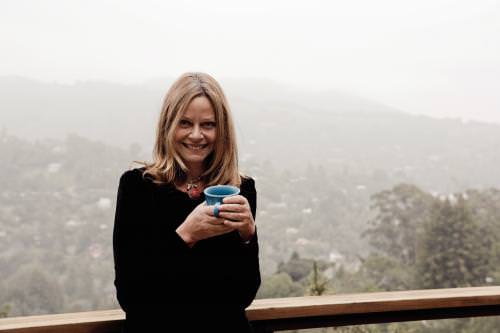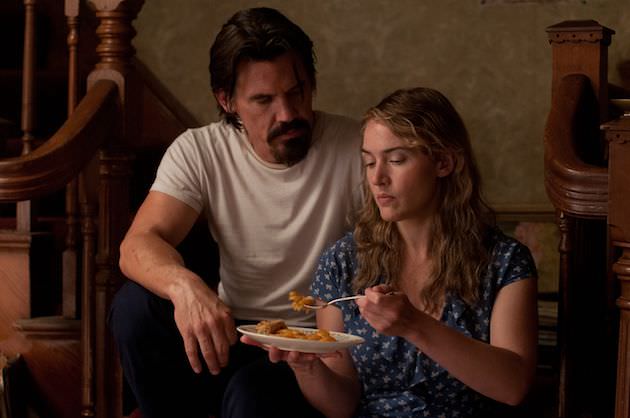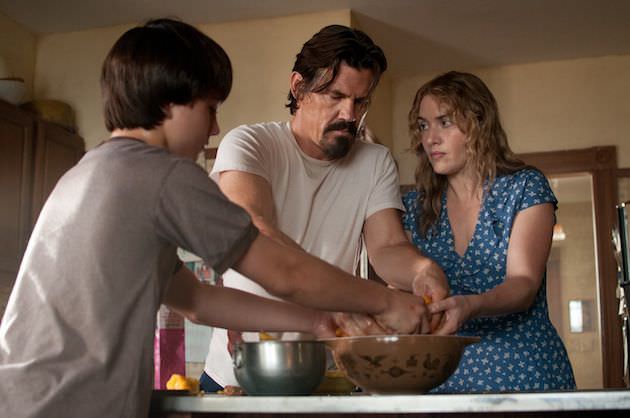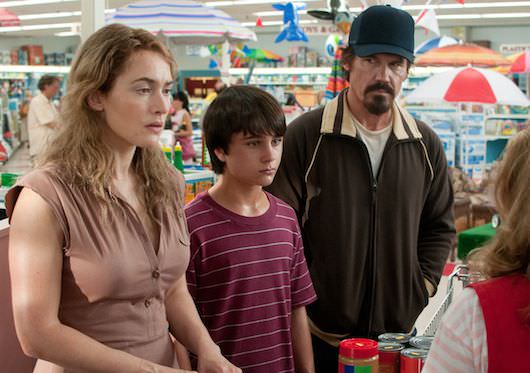Novelist Joyce Maynard on Jason Reitman’s Adaptation of her Labor Day
Joyce Maynard is a rarity in the movie world: a writer who’s thrilled with the film adaptation of her novel. Maynard’s “Labor Day” was adapted for the screen and directed by Jason Reitman. It’s about a reclusive single mother (Kate Winslet), her 13-year-old son (Gattlin Griffith) and the escaped convict (Josh Brolin) who hides out in their rundown New England house and creates, at least for a long weekend, an unorthodox family that fill a need in all three people. Labor Day opens Jan. 31. The author of 13 books including “To Die For” and her latest, “After Her,” mother of three and New Hampshire native who now lives in California, Maynard talked about the process of watching from the sidelines while the movie version of her book brought her story to new audiences.


The is the second of your novels to be made into a movie. What did you learn with To Die For (the 1995 film starring Nicole Kidman and directed by Gus Van Sant) that made things different this time?
I stressed from beginning that this film must be made in New England. To Die For was a terrific film but it was shot in Toronto and it doesn’t quite have the right look. Since New Hampshire doesn’t give tax incentives, they shot ‘Labor Day’ in Massachusetts.
Was there a lot of interest from producers? How did you settle on Jason Reitman?
Jason read the book while it was in galleys; he came in right away. I loved his movies and I knew he was perfect. The discussion ended there.
Did you have any other conditions for him besides shooting the film in New England?
I needed to show [Reitman] how the pie should be. He came over to my house first, then had me go to his house in L.A., and on the first day of filming they brought me to the set. I also had the condition of a cameo: I’m in the grocery store scene with Kate Winslet.


The pie-making scene is pretty central to he film, as it is to the book. How do you react to those who think it’s over the top?
It’s the sexiest pie scene ever in a movie but it might also be one of the best food scenes. I am the mother of sons — strong, macho guys — and they cried when they saw this movie. I like to say it’s a love story but it’s a thriller, too. I think I’ve been well-trained from years of storytelling that things have to happen. I’m not one to write just lovely poetic images. If it seems over the top, I wanted to give a strong alternative to the technological—everything we’re surrounded with. What do you do with overripe peaches besides throw them out? Is there still something we can do that just uses our hands? But certainly if you’re going to be a cynic, that’s the scene.
Where did this book come from?
‘Labor Day’ came from a deep place in me. I’m not the character; I’m not a lonely, single mother afraid to go the store, but I was a single mother raising three kids in a small New Hampshire town for many years. The yearning, a parent taking care of child but no one’s taking care of her; it’s an experience I know and I really wanted to honor that. It’s been easy for people to make fun of this. I call them cynics; the ones who would buy store-bought pie crust. Pie connects a lot of people with their mothers and grandmothers. I started making pies and teaching pie [baking] when my mother died. That was my way of honoring my mother, who was a great pie maker. She was many other things; she was a writer—things that seemed more ‘important” and were significant to me. But she was this wonderful pie maker. So when I watch that scene I think of my mother, who died way too young, and what a gift for her to see that pie, her pie, in the movie.


Despite some lukewarm reviews, you’re one of the few writers happy with the movie version of their novel.
The way I write is already filmic. My process is to imagine a movie and then I write it, and it’s not because I’m trying to get a movie made. I’m a movie person, so I think in terms of the visual and the scene. The flashbacks in the film departed from the book. It was too much to deliver Frank’s story all at once. And the young girl, Eleanor, is a much bigger character in the novel. What informs me as a fiction writer, what informs me as a human being, is once you know a person’s story, you can understand. It doesn’t mean it’s OK, but you can understand just about any story. It’s why I teach memoir. Knowing a person’s story is the route to compassion and forgiveness. I’m not a believer in simple bad guys.
As the author of 13 books and numerous columns and essays, how do you react to constantly being associated with one: “At Home in the World,” which dealt in part with your relationship at 19 with writer J.D. Salinger (who was then 53)?
I used to fight it. I just recognize now; it doesn’t matter what I do, what I publish, whatever else I accomplish in my life, there are people who will identify me with one thing that happened 41 years ago and there’s not a day in my life when it doesn’t come up. So, I’ll talk about it. I’m in that bad Salinger movie [the 2013 documentary Salinger] because the alternative would have been to let them tell it wrong. I wanted it to come from me. I always hope that before people imagine they know the story they’ll at least read my memoir about it. It wasn’t that no one ever spoke about it. For 25 years, I’d been asked about it. So I thought, I’ll write a memoir, and it was almost universally condemned when it came out. I would do it again but it cost me dearly in my career. I’m proud that this fall I brought it out again and I recorded it as an audio book because I wanted that story heard in my voice. It was not a particularly successful book. It got a huge amount of press, so people thought they knew the story and didn’t bother to read the book. There were many critics who proudly said they hadn’t read the book. The book is not about Salinger. It’s about me: my development as a writer, the deaths of my parents, growing up in an alcoholic family. Just one part is about him.
So why such a vicious reaction?
There are people for whom [Salinger] occupies this God-like status. It has to do with the age people are when they form that attachment to that book ["The Catcher in the Rye"].
So it must be rewarding to have success with Labor Day, the book and now the film.
After my memoir, I was persona non grata in the literary world. I had no agent, no book contract. I was at the McDowell Colony and I wrote "Labor Day" and brought it to New York. I was 55 years old and had published 10 books. I showed it to agents and they all said ‘no, we can’t help you.’ It was pretty crushing. An agent recommended by a friend read the book overnight and said. "I think I can sell this book, but you must let me submit it without your name attached." The manuscript was sent to ten pretty big-name editors. There was a bidding war; there was enormous excitement for this mystery novel. There was actually a gossip item speculating that James Franco wrote this hot novel going around town. When it was found that it was me, a number of those editors withdrew those offers or cut them down.
What’s next for you?
I would like to write original screenplay or adapt one of my books myself. Maybe my new novel, ‘After Her,’ since that would be more an independent film. I’m only 60. I have to think of something for the next few decades.




